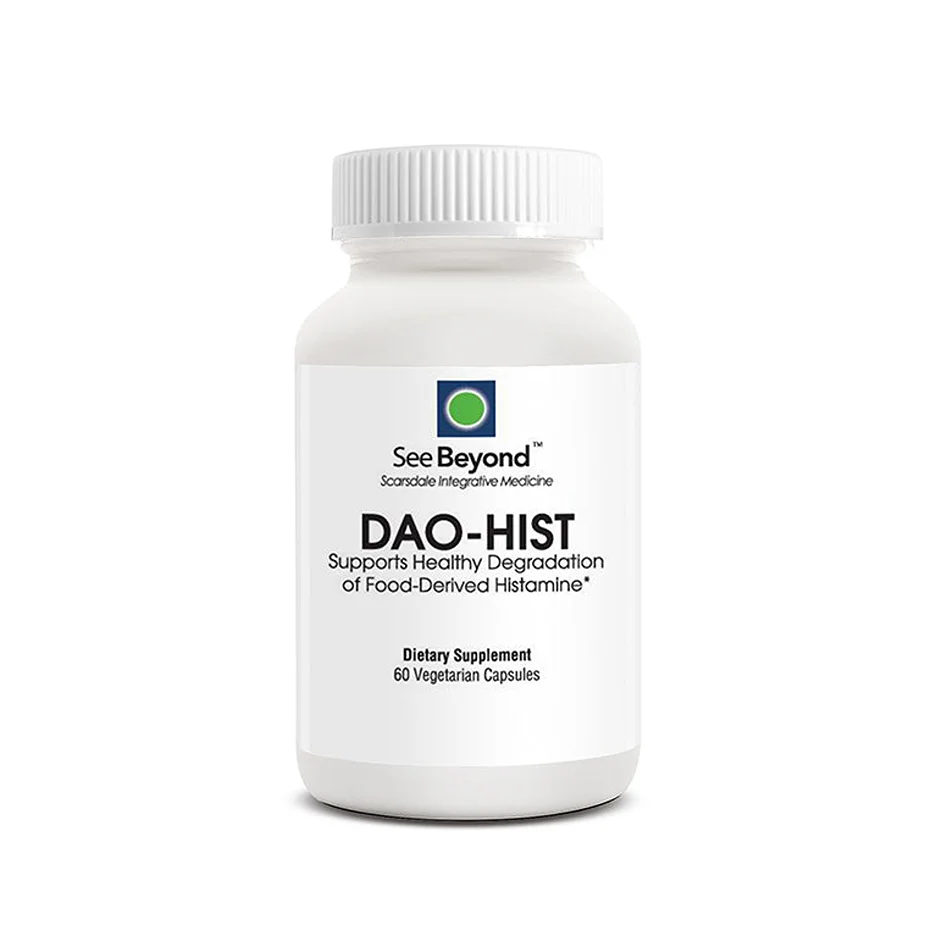Understanding the Relationship Between Drugs, the DAO Enzyme, and Histamine Regulation
Histamine intolerance and its associated reactions are often a silent distress for many, manifesting as allergies, gastrointestinal disturbances, and even headaches.
Central to managing this intolerance is the enzyme Diamine Oxidase (DAO). It’s not just about what we eat, but also about the medicines and drugs we consume, which can play a pivotal role in determining the efficiency of DAO in our body.
In this article, we unravel the intricate relationships between DAO enzymes and various drugs, revealing insights that can be transformative for those battling histamine-related issues.
Diamine Oxidase (DAO) and Antibiotics
Antibiotics have long been hailed for their revolutionary role in combating infectious diseases, but there’s more to the story than meets the eye.
Antibiotics suppress activation of intestinal mucosal mast cells and reduce dietary lipid absorption in rats: Delving into research studies with rats, it’s evident that antibiotics can dampen the activation of intestinal mucosal mast cells.
What does this mean for you? Well, these cells are vital in releasing histamine, and any disruption to their activity can lead to a cascade of reactions. Furthermore, a reduced absorption of dietary lipids indicates that our gut’s functioning is being altered at a more fundamental level, potentially impacting our overall nutritional health.
Antibiotics might possibly have direct effects on DAO activity: Antibiotics don’t just stop at bacteria; their impact may stretch to the very enzymes that regulate histamine in our body.
Some studies suggest that antibiotics could directly meddle with DAO activity, leading to a decrease in the enzyme’s effectiveness. This presents a potential double jeopardy, where the person not only deals with a microbial infection but also risks increased histamine reactions due to impaired DAO function.
In this era of rapid antibiotic consumption, it’s crucial to approach them with a balanced perspective. While they’re indispensable in treating infections, understanding their broader implications on DAO and histamine levels empowers us to make more informed health decisions.
Diamine Oxidase Inhibiting Drugs
The modern pharmaceutical landscape offers a plethora of medications aimed at alleviating diverse health conditions.
But like all things in medicine, it’s a delicate balance of benefits versus side effects. One such concern arises with certain drugs that inadvertently inhibit the activity of Diamine Oxidase, potentially leading to heightened histamine reactions.
Various drugs have been tested as inhibitors of diamine oxidase based on chemical relationships to the enzyme substrates: Over the years, researchers have studied numerous drugs that could potentially inhibit DAO due to their chemical similarities to the substrates of this enzyme.
It’s akin to a puzzle – if a piece looks similar enough to the original, it might just fit, even if it’s not the right one. Similarly, some drugs might “fit” or interact with the same regions that DAO’s natural substrates would, thereby reducing the enzyme’s effectiveness in breaking down histamine.
Many agents in medicaments have the negative effect of being diamine oxidase inhibitors or inhibitors of other histamine degrading enzymes: It’s not just a singular set of drugs that pose this challenge.
A range of agents found in common medications can inhibit not only DAO but also other crucial enzymes that degrade histamine. This multipronged inhibition can escalate histamine levels in the body, potentially leading to an array of symptoms ranging from skin flushes to gastrointestinal discomfort.
When navigating the vast world of medications, it’s imperative to be cognizant of these potential interactions. Especially for those who already have a predisposition to histamine intolerance, awareness of such drug-enzyme interactions can be the key to maintaining well-being.
Understanding these nuances ensures that we’re not only treating our immediate ailments but also safeguarding our body’s long-term harmony.
Remember, it’s always a good idea to consult with a healthcare professional if you have concerns about any medication you’re taking, especially if you suspect it might be affecting your histamine levels.
Medications that Reduce the Effectiveness of Diamine Oxidase

The saying, “Every action has an equal and opposite reaction,” rings true even in the realm of pharmacology.
While medications are designed to target specific ailments, their influence can ripple into unexpected areas of our body’s biochemistry. For individuals already grappling with histamine intolerance or related issues, this knowledge is essential.
Many prescription drugs can interfere with levels of DAO and HNMT in the body: Both DAO and HNMT (histamine N-methyltransferase) are our primary defense mechanisms against elevated histamine levels.
However, some prescription drugs, either due to their chemical structure or mechanism of action, can diminish the efficacy of these enzymes. This means that while you might be treating one condition, you could inadvertently be exacerbating histamine intolerance symptoms.
There is a set of drugs involved in the deficiency or low activity of the Diamine Oxidase enzyme: These specific drugs either block or inhibit enzymes vital for histamine metabolism, particularly DAO, or stimulate the release of endogenous histamine.
When DAO’s activity is compromised, histamine is not broken down efficiently, which can manifest in various discomforting symptoms.
For instance, ever had a sneezing bout or itchy skin after taking certain medications and wondered why?
It’s possible that the drug you consumed affected your DAO levels or histamine release. And while it’s not a universal reaction, those with a predisposition towards histamine intolerance might feel these effects more acutely.
Navigating the labyrinth of drug interactions and side effects can feel daunting. But equipped with insights like these, you can make more informed choices, keeping both your immediate and long-term health in perspective.
Remember, communication is key. If you ever suspect a medication is affecting your histamine levels or DAO activity, it’s vital to discuss it with your healthcare provider. Together, you can find a balance that respects both your immediate needs and your body’s intricate biochemistry.
Diamine Oxidase Opiates
Opiates, known primarily for their pain-relieving properties, have transformed the lives of countless individuals suffering from acute and chronic pain. But as with many potent medications, the spectrum of their effects extends beyond just pain relief, occasionally intersecting with our body’s histamine metabolism and regulation.
Opiates can cause severe morphine-induced histamine reactions, such as pruritus, urticaria, nausea, and flushing:
Have you ever heard of someone experiencing itchiness or redness after taking morphine or another opiate? This isn’t just a random side effect.
Opiates can trigger a surge in histamine release, leading to symptoms that resemble allergic reactions. Pruritus (itchiness), urticaria (hives), nausea, and skin flushing can be particularly pronounced in some individuals, casting a shadow on the relief they sought from the pain.
Diamine oxidase supplementation can help manage symptoms and improve histamine intolerance: For those frequently relying on opiates for pain management, the added discomfort from histamine reactions can feel overwhelming.
Enter DAO supplementation.
By bolstering the body’s DAO levels, one can potentially counterbalance the histamine surge induced by opiates. This not only alleviates the uncomfortable side effects but also improves the overall tolerance to histamine.
The marriage of pain management and histamine regulation is intricate, requiring a delicate balancing act. For those venturing into opiate therapy, being forewarned about potential histamine-related side effects can make all the difference in their treatment experience.
As we’re discovering, the medical world is filled with interconnected pathways, where one medicine’s boon might intersect with another system’s challenge. But with knowledge, understanding, and proactive strategies, like DAO supplementation, we can navigate these complexities with grace and efficacy.
Drugs that Inhibit Diamine Oxidase
Histamine, in moderation, plays a pivotal role in our body’s functions. Yet, it’s the delicate balance of its levels that ensures our well-being. Some medications, though created for other primary purposes, inadvertently disrupt this balance by inhibiting the DAO enzyme.
Cimetidine and verapamil showed inhibition of about 50%: Two notable examples are Cimetidine, often prescribed for stomach ulcers and acid reflux, and Verapamil, a calcium channel blocker used to treat conditions like high blood pressure and arrhythmias.
Both these drugs, studies suggest, can inhibit DAO activity by approximately 50%. This significant reduction could potentially elevate histamine levels, leading to symptoms in those with histamine sensitivity or intolerance.
Insufficient activity of DAO can occur based on several factors: This isn’t merely about medications. A genetic predisposition can set the stage for reduced DAO activity.
Furthermore, diseases of the gastrointestinal tract, like inflammatory bowel diseases, infections, parasitic infestations, dysmicrobia, and metabolic malabsorption, can diminish DAO production by the affected enterocytes (intestinal cells).
Additionally, consumption of alcohol or other biogenic amines can also inhibit DAO, further amplifying the risk of histamine-related symptoms.
Our journey through the world of DAO enzymes and its myriad interactions with drugs underscores the intricate dance of biochemistry within our bodies. Every pill we take, every substance we consume, potentially ripples into a series of biochemical reactions, sometimes harmonious and at times, discordant.
If you’re someone who frequently experiences unexplained symptoms like headaches, skin rashes, or digestive discomforts, it’s worth considering the role of histamine and the potential influence of your medications on DAO levels. Consultation with a healthcare professional can provide tailored insights and potential pathways to relief.
Remember, knowledge is your ally. With a deeper understanding of these dynamics, you can make empowered choices for your health, ensuring harmony and well-being.
FAQ on DAO Drugs and Histamine Intolerance

What are the common symptoms of histamine intolerance?
People with histamine intolerance can experience a wide array of symptoms when they consume foods high in histamine or when their body releases excess histamine. Some common symptoms include Abdominal pain, Osteopathic pain, nasal congestion, headaches, and skin rashes.
Why do some individuals develop histamine intolerance?
Histamine intolerance often arises from a combination of genetic factors and external influences. This can range from a genetic predisposition that affects the enzyme activity responsible for breaking down histamine in the intestinal mucosa, to nutrient deficiencies that hinder the body’s ability to process histamine effectively.
How do certain foods affect people with histamine intolerance?
Some foods have a higher histamine content than others. When consumed in large amounts, these histamine-rich foods can trigger the release of histamine in the body, exacerbating the symptoms in those with histamine intolerance. Citrus fruits, fermented foods, and aged cheeses are examples of foods rich in histamine.
How can I manage my histamine intolerance through diet?
A low-histamine diet can be beneficial for individuals struggling with histamine intolerance. This involves avoiding or limiting the intake of histamine-rich foods and focusing more on foods with a low histamine content. Always consult with a nutritionist or healthcare professional before making drastic changes to your diet.
Are there other factors, besides food, that can trigger symptoms in people with histamine intolerance?
Yes, besides histamine-rich foods, other factors can lead to an increase in the amounts of histamine in the body or hinder the body’s ability to break it down. This includes excess alcohol consumption, certain medications that affect enzyme activity, and damage to the intestinal mucosa due to infections or other gastrointestinal diseases.
